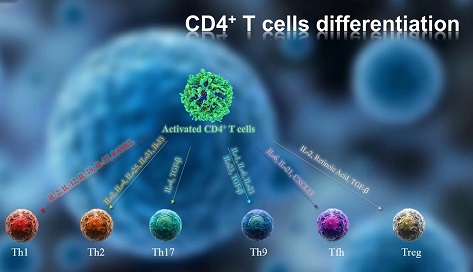U.S. NIAID Study Reveals Shocking Insights into Rare Immune Disease Called Idiopathic CD4 Lymphocytopenia. Relevant For New SARS-CoV-2 Sublineages?
Medical News - Idiopathic CD4 Lymphocytopenia (ICL) May 09, 2023 2 years, 9 months, 2 weeks, 18 hours, 45 minutes ago
Medical News: A groundbreaking 11-year study led by the U.S. National Institute of Allergy and Infectious Diseases that was initiated by Dr Anthony Fauci Nation has exposed shocking insights into idiopathic CD4 lymphocytopenia (ICL), a rare and obscure immune deficiency that leaves individuals susceptible to a myriad of infectious diseases, autoimmune diseases, and cancers.

The study has confirmed that individuals with the most severe cases of ICL face the highest risk of contracting these life-threatening diseases.
Idiopathic CD4 lymphocytopenia (ICL), ICL, an enigmatic condition marked by an abnormally low count of CD4+ T-cells (a type of white blood cell), has long puzzled scientists and doctors alike. Unlike HIV, a virus that weakens the immune system if left untreated, ICL has no known cause and is not transmitted from person to person. With limited therapeutic options available, ICL remains a challenging disease to manage.
The colossal study, spearheaded by Dr Irini Sereti, M.D., M.H.S., and Dr Andrea Lisco, M.D., Ph.D., of the HIV Pathogenesis Section in the Laboratory of Immunoregulation at the U.S. National Institute of Allergy and Infectious Diseases (NIAID), observed and analyzed the presence of opportunistic infections and other clinical conditions among 91 participants with ICL.
The study findings revealed a shocking prevalence of opportunistic infections, including human papillomavirus-related diseases (in 29% of participants), cryptococcosis (24%), molluscum contagiosum (9%), and non-tuberculous mycobacterial diseases (5%).
Alarmingly, participants with CD4+ T-cell counts below 100 cells per cubic millimeter (mm³) had a more than five-fold higher risk of opportunistic infections compared to those with CD4+ T-cell counts above 100 cells.
Cancer risk was also significantly higher in individuals with the lowest CD4+ T-cell counts. However, the risk of autoimmune disease was found to be lower in these patients. The study's findings emphasize the inverse correlation between CD4+ T-cell count and susceptibility to viral, fungal, and mycobacterial infections, as well as certain cancers.
The comprehensive study spanned 11 years and involved an evaluation of the clinical, genetic, immunologic, and prognostic characteristics of 108 patients initially. Whole-exome and targeted gene sequencing were employed to identify genetic causes of lymphopenia, while longitudinal linear mixed-model analyses of T-cell count trajectories were conducted to evaluate predictors of clinical events, response to immunization against coronavirus disease 2019 (COVID-19), and mortality.
Surprisingly, the risk of death in ICL patients was found to be similar to that in the age- and sex-adjusted general population. Nevertheless, the prevalence of cancer was observed to be higher in this patient cohort.
The study's shocking revelations have spurred the NIAID to continue its relentless pursuit of research on the natural history of rare conditions like ICL, seeking a deeper understanding of disease progression and potential therapeutic interventions.
The study findings were published in the peer reviewed New England Journal of Medicine.
https://www.nejm.org/doi/10.1056/NEJMoa2202348
gt;
What is interesting however is that the same US. NIAID which is part of the U.S. NIH was also funding gain of function research for the SARS-CoV-2 coronavirus and was also involved in various studies and vaccine and antiviral developments for COVID-19.
While we now know that SARS-CoV-2 infections not only impairs and also decreases CD8+ cell counts, various
Medical News reports have also shown that it also affects the CD4+ cells as well.
https://www.thailandmedical.news/news/breaking-news-u-s-nih-study-finds-that-those-with-long-covid-neurological-symptoms-have-lower-levels-of-cd4-and-cd8-t-cells
https://www.thailandmedical.news/news/yet-another-covid-19-research,-this-time-by-la-jolla-institute-for-immunology-shows-that-cd4-cells-are-affected-by-sars-cov-2-coronavirus
https://www.thailandmedical.news/news/breaking-u-s-nih-study-reveals-that-membrane-m-proteins-of-sars-cov-2-induce-altered-cd4-t-cells-that-dysregulate-interferon-signaling
https://www.thailandmedical.news/news/covid-19-immunology-study-reveals-that-sars-cov-2-causes-cd4-t-cells-and-cd25-hyperactivation-while-repressing-foxp3-genes-in-severe-covid-19
https://www.thailandmedical.news/news/breaking-news-covid-19-study-reveals-that-sars-cov-2-uses-cd4-cells-to-infect-t-helper-lymphocytes--covid-19-a-potent-version-of-airborne-hiv
There are strong speculations that the newer emerging XBB, XBC and even BA.5 sub-lineages are not only evolving aggressively to evade the last remaining immunity protections by T Cells but are also evolving to impair and damage the various T cells including CD4!
https://www.thailandmedical.news/news/covid-19-news-is-sars-cov-2-evolving-to-evade-t-cell-immunity-and-also-destroy-t-cells-with-the-debut-of-xbb-1-16,-eg-1,-eu-1-1-and-fd-1-1-variants
So perhaps the timing of this study is timely or maybe even preplanned!
For the latest
Medical News, keep on logging to Thailand Medical News.
Read Also:
https://www.thailandmedical.news/news/warning-sars-cov-2-infections-are-accelerating-t-cell-immunosenescence-and-increasing-cardiovascular-disease-risks-in-cmv-seropositive-individuals
